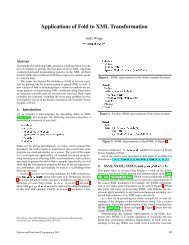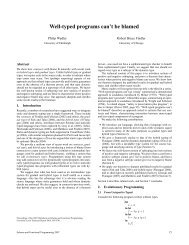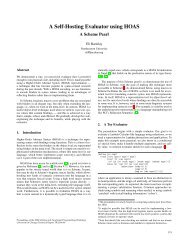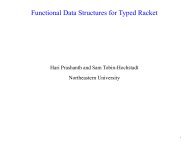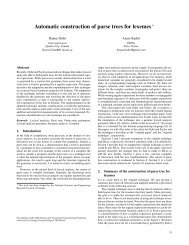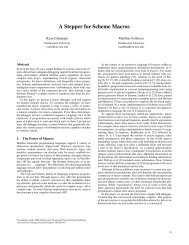2006 Scheme and Functional Programming Papers, University of
2006 Scheme and Functional Programming Papers, University of
2006 Scheme and Functional Programming Papers, University of
Create successful ePaper yourself
Turn your PDF publications into a flip-book with our unique Google optimized e-Paper software.
This ends the implementation <strong>of</strong> the subset <strong>of</strong> miniKanren<br />
used in this paper. Below we define the three additional<br />
goal constructors that complete the entire embedding:<br />
cond a <strong>and</strong> cond u , which can be used to prune the search<br />
tree <strong>of</strong> a program, <strong>and</strong> project, which can be used to access<br />
the values <strong>of</strong> variables.<br />
cond a <strong>and</strong> cond u correspond to the committed-choice<br />
<strong>of</strong> Mercury, <strong>and</strong> are used in place <strong>of</strong> Prolog’s cut [7, 12].<br />
Unlike cond e , only one cond a -clause or cond u -clause can<br />
return an a ∞ : the first clause whose first goal succeeds. With<br />
cond a , the entire stream returned by the first goal is passed<br />
to bind ∗ (see pick a ). With cond u , a singleton stream is<br />
passed to bind ∗ —this stream contains the first value <strong>of</strong> the<br />
stream returned by the first goal (see pick u ). The examples<br />
from chapter 10 <strong>of</strong> The Reasoned <strong>Scheme</strong>r [6] demonstrate<br />
how cond a <strong>and</strong> cond u can be useful <strong>and</strong> the pitfalls that<br />
await the unsuspecting reader.<br />
(define-syntax cond a<br />
(syntax-rules ()<br />
(( (g 0<br />
g . . . ) (g 1<br />
ĝ . . . ) . . . )<br />
(λ G (s)<br />
(if ∗ (pick a (g 0<br />
s) g . . . ) (pick a (g 1<br />
s) ĝ . . . ) . . . )))))<br />
(define-syntax cond u<br />
(syntax-rules ()<br />
(( (g 0<br />
g . . . ) (g 1<br />
ĝ . . . ) . . . )<br />
(λ G (s)<br />
(if ∗ (pick u (g 0<br />
s) g . . . ) (pick u (g 1<br />
s) ĝ . . . ) . . . )))))<br />
(define-syntax if ∗<br />
(syntax-rules ()<br />
(( ) (mzero))<br />
(( (pick e g . . . ) b . . . )<br />
(let loop ((a ∞<br />
e))<br />
(case ∞<br />
a ∞<br />
(if ∗ b . . . )<br />
((a) (bind ∗ a ∞ g . . . ))<br />
((a f ) (bind ∗ (pick a a ∞ ) g . . . ))<br />
((f ) (inc (loop (f )))))))))<br />
(define-syntax pick a<br />
(syntax-rules ()<br />
(( a a ∞ ) a ∞ )))<br />
(define-syntax pick u<br />
(syntax-rules ()<br />
(( a a ∞ ) (unit a))))<br />
project applies the implicit substitution to zero or more<br />
lexical variables, rebinds those variables to the values returned,<br />
<strong>and</strong> then evaluates the goal expressions in its body.<br />
The body <strong>of</strong> a project typically includes at least one begin<br />
expression—any expression is a goal expression if its value<br />
is a miniKanren goal. project has many uses, such as displaying<br />
the values associated with variables when tracing a<br />
program.<br />
(define-syntax project<br />
(syntax-rules ()<br />
(( (x . . . ) g 0<br />
g . . . )<br />
(λ G<br />
(s)<br />
(let ((x (walk ∗ x s)) . . . )<br />
(bind ∗ (g 0<br />
s) g . . . ))))))<br />
<strong>Scheme</strong> <strong>and</strong> <strong>Functional</strong> <strong>Programming</strong>, <strong>2006</strong> 117




